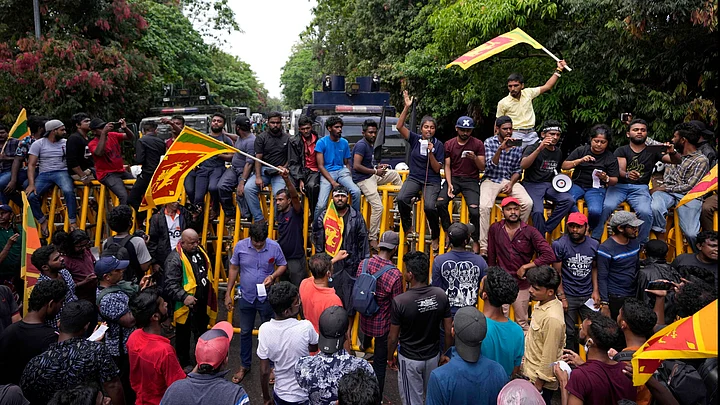Sri Lankan President Gotabaya Rajapaksa, on Friday, 6 May, declared a state of emergency, which will come into effect from midnight (7 May), giving security forces sweeping powers amid anti-government protests, AFP reported. This is the second time in five weeks that an emergency has been declared in the country.
The island nation has been going through an economic meltdown of a scale unseen since the country's financial crisis of 1948.
A spokesman for the president said that he had decided to invoke the tough laws to "ensure public order". This comes after trade unions staged a nationwide strike on Friday, demanding that the president resigns from his post amid the worsening economic conditions in the country.
Emergency Not a Solution, Says Bar Association
The Bar Association of Sri Lanka (BASL) expressed grave concern over the president declaring a country-wide state of emergency, local media reported.
The BASL asked the president to explain the reasons for his decision and to ensure that the fundamental rights are not violated by the decision.
"We call upon His Excellency to revoke the proclamation declaring a state of emergency and to ensure that the fundamental rights of the people such as the freedom of expression including the freedom of speech and publication and the freedom of peaceful assembly which are aspects of the sovereignty of the people are respected and protected and not violated by the State or its agents," the Bar Association said.
"As was stated earlier on the 2nd of April 2022, when the president declared a state of emergency for a brief period of time, the BASL remains of the view that a declaration of a state of emergency is not the answer to the present situation in the country including the spate of public protests and strikes which have occurred. These protests reflect the desperate situation of the people who are seeking to secure for themselves, and their families some of the most basic essentials in life. Similarly, the declaration of the state of emergency will further complicate the efforts at restoring political stability in Sri Lanka," the statement read.
Country-wide Protests
The protesters had given an ultimatum to President Gotabaya Rajapaksa and his government to resign by 11 May.
"What we did today was only to tell Gotabaya Rajapaksa to step down. If he doesn't leave by 11 May, we will launch island-wide trade union action using over 2,000 trade unions, and will bring the country to a continuous standstill. There will be no electricity, water, gas and fuel," Lal Bangamuwage, president of Independent Harbour Trade Union, told the media, according to IANS.
Thousands of university students and the general public blocked all entrances to the Parliament, protesting against 225 lawmakers from all parties for their failure to solve the current crisis. The police had to use tear gas and water cannons to disperse the protesters who demanded resignation of all lawmakers.
On Thursday, the police had barricaded the entrances to the Parliament to prevent the protesters from entering. Despite police presence, university students damaged several iron barricades and camped outside the Parliament overnight.
Workers Go On Strike
As many as a million workers went on strike, organised by Sri Lanka's trade unions. Industrial workers protested with black flags, signifying aggression against the ruling government. Meanwhile, private buses went off roads, with Private Bus Operators Association chairman Gemunu Wijeratne telling NDTV,
"We are not providing services today, but if groups of people want to join the anti-government protests within a radius of 20 kilometres, we will give our buses free of charge."
More About the Sri Lankan Crisis
Prices of essential commodities like rice, milk, and oil have skyrocketed, resulting in massive nationwide protests leading to political instability.
The main cause is the shortage of foreign currency, which has led to a huge reduction in imports of essential items like petroleum, food, paper, sugar, lentils, medicines, and transportation equipment.
(With inputs from IANS and AFP.)
